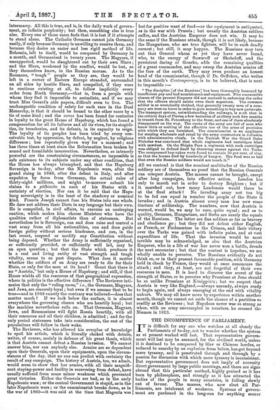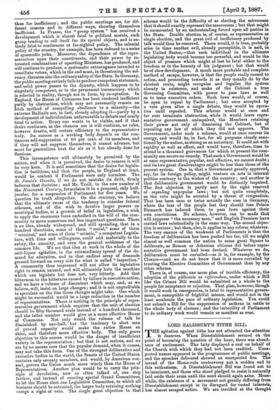THE INCOMPETENCE OF PARLIAMENT.
JT is difficult for any one who watches at all closely the Parliaments of to-day, not to wonder whether the system as at present worked will last. That representative govern- ment will last may be assumed, for the civilised world, unless it is destined to be conquered by Slav or Chinese hordes, or reduced to anarchy by an explosion from below, has got beyond mere tyranny, and is penetrated through and through by a passion for discussion with which mere tyranny is inconsistent. But representative government does not imply of necessity direct government by large public meetings, and there are signs abroad that this particular method, highly praised as it has been by philosophers, and strongly as it has attracted the bodies of the people in many countries, is falling slowly out of favour. The masses, who now elect all Par- liaments, are intolerant of weakness. Systems of govern- ment are pardoned in the long-run for anything sooner JT is difficult for any one who watches at all closely the Parliaments of to-day, not to wonder whether the system as at present worked will last. That representative govern- ment will last may be assumed, for the civilised world, unless it is destined to be conquered by Slav or Chinese hordes, or reduced to anarchy by an explosion from below, has got beyond mere tyranny, and is penetrated through and through by a passion for discussion with which mere tyranny is inconsistent. But representative government does not imply of necessity direct government by large public meetings, and there are signs abroad that this particular method, highly praised as it has been by philosophers, and strongly as it has attracted the bodies of the people in many countries, is falling slowly out of favour. The masses, who now elect all Par- liaments, are intolerant of weakness. Systems of govern- ment are pardoned in the long-run for anything sooner
than for inefficiency ; and the public meetings are, for dif- ferent reasons and in different ways, showing themselves inefficient In France, the "group system" has received a development which is almost fatal to political morals, each group tending to sell itself for its special objects, and is en- tirely fatal to continuous or far-sighted policy. The colonial policy of the country, for example, has been reduced to a series of spasmodic jerks. Moreover, the dependence of the repre- sentatives upon their constituents, and their power by in- terested combinations of upsetting Ministers, has produced, and will continue to produce, a systematic extravagance intended to conciliate voters, which in the end must, in threatening the sol- vency, threaten also the ordinarysafetyof the State. In Germany, the public meeting entirely fails to produce competent statesmen, and solid power passes to the dynasty, which happens to be singularly competent, or to the permanent bureaucracy, which is selected in reality, though not in form, by co-optation. In England, the House of Commons has been rendered inefficient partly by obstruction, which may not necessarily remain an Irish method of compelling obedience to a minority—the extreme Radicals are, in fact, already adopting it—partly by a development of individualism unfavourable to debate and nearly fatal to action. Every one wants to be visible, and if that desire continues, as the chances are it will continue, no rules, however drastic, will restore efficiency to the representative body. Its success as a working body depends on the con- tinuous self-suppression of 80 per cent, of its members, and if they will not suppress themselves, it cannot advance, but must for generations beat the air as it has already done for Sessions.
This incompetence will ultimately be perceived by the nation, and when it is perceived, the desire to remove it will be very keen. It is said sometimes that the desire for legisla- tion is factitious, and that the people, in England at least, would be content if Parliament were only harmless. The St. James's Gazette, if we do not mistake its drift, firmly believes that doctrine ; and Mr. Trail, in the new number of the Nineteenth Centwy, formulates it in a proposal, only half- jocular, for a suspension of Parliament for five years. We question its truth altogether. On the contrary, we believe that the ultimate cause of the tendency to consider federal schemes, and of the wish to devolve larger powers on municipal bodies, is a growth of belief in legislation, a wish to apply the enormous force embodied in the will of the com- munity to more numerous and less important questions. There is an idea, already widespread, and still spreading, that in a hundred directions, some of them "social," some of them "criminal," and some of them "artistic," a competent Legisla- ture, with time and willingness, could add materially to the safety, the amenity, and even the general nobleness of the common life. We see that idea at work in the whole of the anti-liquor agitation, in the extraordinary spread of the de- mand for education, and in that endless array of demands pressed forward on every side for what is called "inspection." A community thus impressed will not allow its legislative right to remain unused, and will ultimately hate the machine which can legislate but does not, very bitterly. Add that bitterness to the bitterness caused by failure in executive action, and we have a volume of discontent which may, and, as We believe, will, insist on large changes ; and it is not unprofitable to speculate on the line those changes might take. One which might be successful would be a large reduction in the number of representatives. There is nothing in the principle of repre- sentative government which requires that the unit of election should be fifty thousand souls instead of a hundred.thousand, and the latter number would give us a more effective House of Commons. Not only would the volume of talk be diminished by one-half, but the tendency to elect men of proved capacity would make the entire House an abler, and therefore more effective body. The only grave objection to this course would be the danger of insufficient variety in the representation ; but that is not serious, and we are by no means sure that the popular demand, when it comes, may not take this form. One of the strongest deliberative and executive bodies in the world, the Senate of the United States, contains only seventy members, and would, by American con- sent, govern the Union much more wisely than the House of Representatives. Another plan would be to carry the prin- ciple of devolution, now so often talked of, one step farther, and instead of creating special Grand Committees, to let the House elect one Legislative Committee, to which all business should be entrusted, the larger body retaining nothing except a right of veto. The single great objection to that
scheme would be the difficulty of so electing the microcosm that it should exactly represent the macrocosm ; but that might be surmounted by an understanding forced upon all parties in the State. Double election is, of course, as representative as single election, and the great evil of inefficiency produced by talk would thus be removed. There would, it is true, probably arias in time another evil, already perceptible, it is said, in the United States,—that each individual in the ultimate legislating body would become too powerful, and would be the object of pressure which might at last be fatal either to the freedom or to the honesty of his judgment ; but that would
be of slow development. A much more probable and complete method of escape, however, is that the people really roused to action, and proceeding towards it as they usually do by the shortest route, might recognise and legalise the system already in existence, and make of the Cabinet a true Governing Committee, with power to pass laws as well as to issue executive orders. Such laws would, of course, be open to repeal by Parliament ; but once accepted by a vote given after a single debate, they would be opera- tive until repealed. This scheme would at once and for ever terminate obstruction, while it would leave repre- sentative government unimpaired, the Members retaining their power not only of dismissing the Cabinet, but of repealing any law of which they did not approve. The Government, under such a scheme, would at ones recover its energy, and would be, in fact, for all purposes clearly sanc- tioned by the nation, as strong as an autocracy. It could act with rapidity as well as effect, and would have, therefore, time to attend to a thousand grievances for which at present the com- munity can secure no remedy. That such a Government would be at once representative, popular, and effective, we cannot doubt ; and its two great disadvantages might be less than those of the present system. One is, that a Government greatly approved, say, for its foreign policy, might venture on acts in internal politics contrary to the wishes of the country ; and another is that deliberative government would be distinctly impaired. The first objection is partly met by the right reserved of repealing unpopular laws ; but not quite completely, as the veto might be arrested by a threat of resignation. That has been once or twice actually the case in Germany, where the fear of the people lest they should lose Prince Bismarck has induced them to pass laws against their own convictions. No scheme, however, can be made that will suppress "the necessary man," and English Premiers have carried laws substantially in the same way. The second objec- tion is serious ; but then, also, it applies to any reform whatever. The very essence of the weakness of Parliaments is that the freedom of deliberation has been pushed too far, till we might almost as well summon the nation to some great Square to deliberate, as Roman or Athenian citizens did before repre- sentative government had been devised. Whatever we do, deliberation must be curtailed—as it is, for example, by the Closure—and we do not know that it is more curtailed by trusting the Elective Committee of Government than by any other scheme.
There is, of course, one more plan of terrible efficiency, the adoption of the plebiscite or referendum, under which a Bill like the Crimes Bill would be submitted as a whole to the people for acceptance or rejection. That plan, however, though it would work in emergencies, is fatal to representative govern- ment, is susceptible of frightful misuse, and would not in the least accelerate the pace of ordinary legislation. You could not submit a Bill for the suppression of anthrax in cattle to the whole body of electors ; and the imbecility of Parliament to do ordinary work would remain as manifest as ever.



































 Previous page
Previous page